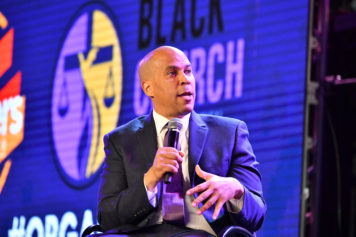U.S. Sen. Cory Booker told an audience at the Center for American Progress this week that the war on drugs has replaced slavery and Jim Crow as the latest means to disenfranchise people of color.
The senator reflected on his time at Stanford and said that while students at his alma mater and other colleges could get away with having small amounts of marijuana, inner city youth are charged with felonies for possessing the drug.
“If you grew up where I grew up, you would experience a very different criminal justice system than Camden, New Jersey,” Booker told the audience of progressive activists, according to a story on nj.com.
Booker was raised in suburban Harrington Park, New Jersey.
Booker said the issue should attract both Republicans and Democrats. On one hand, it would mean smaller government, while also allowing people from minority communities to re-enter society as productive Americans.
“Minorities do not believe this country will give them a fair shake,” Booker said. “Hopelessness is a really toxic and dangerous state.”
Former Ohio Gov. Ted Strickland praised Booker as a leader in the progressive movement.
“Cory Booker is viewed as a rising star within the progressive movement,” Strickland said. “He’s viewed as one of the articulate, bright, ambitious, talented progressive Democrats.”
Booker and Sen. Rand Paul (R-Ky.) introduced the “REDEEM Act” in July to reduce penalties for low-level drug offenders.
The bill would erase criminal records for people under 15 convicted of non-violent crimes, and seal the records of 15- to 17-year olds. It would repeal the ban on federal welfare benefits for those convicted of drug violations, ban solitary confinement of juvenile inmates except “in the most extreme circumstances,” create a “broad-based federal path” for adults to petition to seal criminal records, and raise the age of criminal responsibility when suspects can be tried as adults to 18.
“It is a source of so much of the pain of economic injustice, social injustice,” Booker said, according to nj.com.


